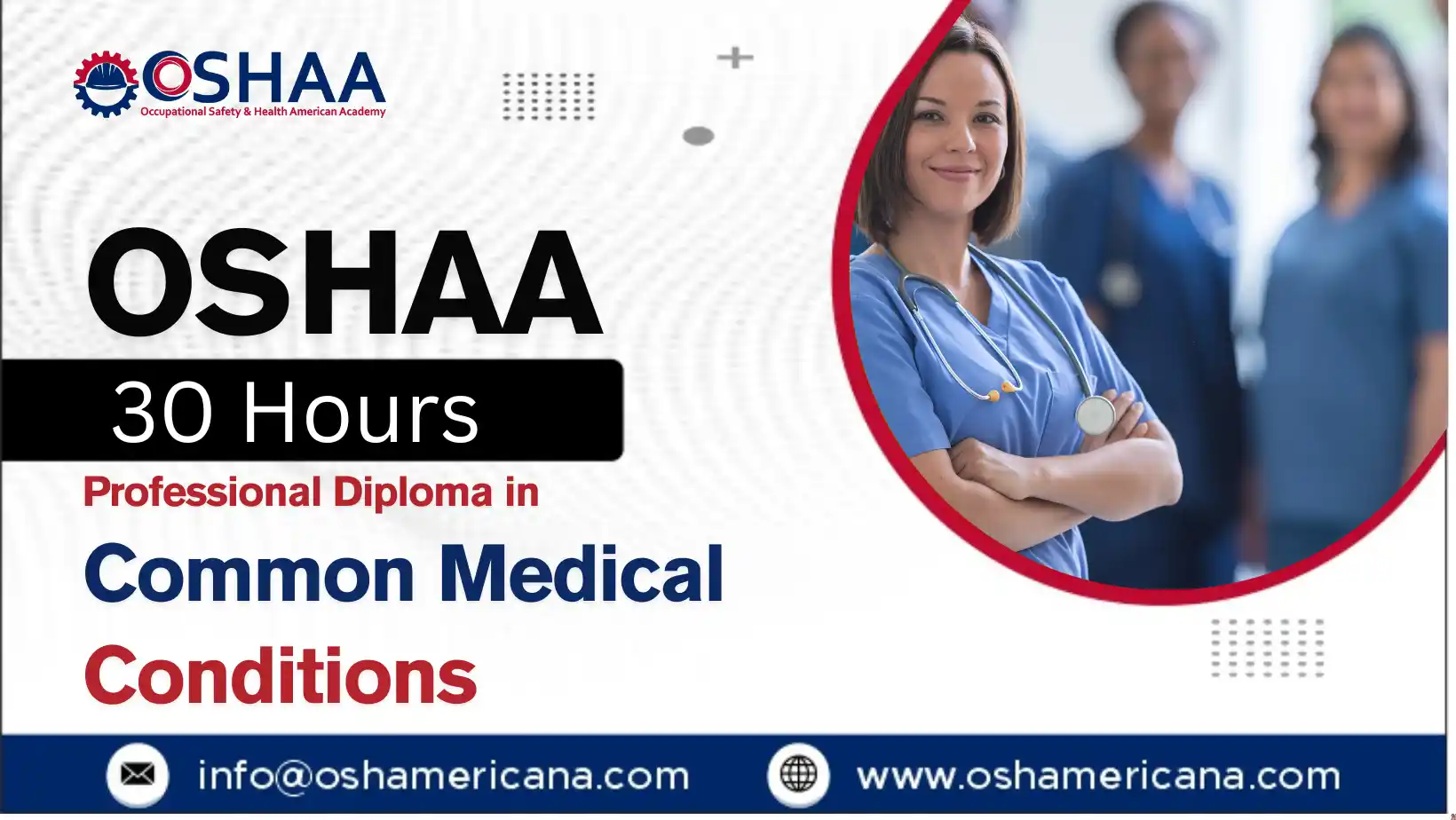Understanding common medical conditions is essential for anyone working in healthcare, social care, or related support services. Whether in clinical settings, community care, or health education, the ability to recognise, interpret, and respond to frequent health concerns is a fundamental part of quality care delivery. The OSHAA 30-Hours Professional Diploma in Common Medical Conditions is designed to equip participants with essential knowledge of prevalent health issues, including their symptoms, underlying causes, and management strategies.
The OSHAA Professional Diploma in Common Medical Conditions is a structured, theory-based programme developed to provide participants with a strong foundation in general medical awareness. Spanning 30 guided hours, the course addresses a wide range of conditions commonly encountered in primary care and community health settings, including cardiovascular, respiratory, endocrine, neurological, gastrointestinal, and musculoskeletal disorders.
This course is ideal for those looking to enhance their knowledge of clinical conditions to better support patient understanding, care delivery, or healthcare communication. It aligns with UK professional standards and can contribute to ongoing continuing professional development (CPD).
The OSHAA Diploma in Common Medical Conditions stands out for its relevance, accessibility, and professional value. Developed by experienced educators and healthcare specialists, the course content is practical, up-to-date, and aligned with current UK standards in health education. It provides an ideal balance between medical theory and applied understanding, ensuring participants are equipped to support others with accuracy and empathy.
The OSHAA 30-Hours Professional Diploma in Common Medical Conditions offers participants a thorough and professionally relevant introduction to a wide range of health issues affecting individuals today. With practical learning outcomes, comprehensive content, and flexible delivery, this course prepares participants to play a more informed, supportive, and responsive role within healthcare and community environments.
OSHAA 30-Hours Professional Diploma in Common Medical Conditions
Study Units
Learning Outcomes
Introduction to Common Medical Conditions and Clinical Terminology (3 hours)
- Understand the importance of recognising common medical conditions in healthcare settings
- Become familiar with basic clinical terminology used in describing symptoms and diagnoses
- Identify the key systems of the human body and their related health issues
- Recognise the role of early detection and communication in patient care
Cardiovascular Disorders: Hypertension, Coronary Artery Disease, Heart Failure (4 hours)
- Identify the causes, risk factors, and symptoms of major cardiovascular disorders
- Understand the basic pathophysiology of hypertension, coronary artery disease, and heart failure
- Learn about the lifestyle and clinical approaches used in managing cardiovascular health
- Recognise warning signs that may require urgent medical attention
Respiratory Conditions: Asthma, Chronic Obstructive Pulmonary Disease (COPD), Pneumonia (4 hours)
- Understand the mechanisms and symptoms of common respiratory conditions
- Identify environmental and behavioural triggers affecting respiratory health
- Learn about treatment strategies including medication and oxygen therapy
- Support awareness of respiratory care plans and emergency responses
Endocrine Disorders: Diabetes Mellitus and Thyroid Dysfunction (6 hours)
- Gain an understanding of hormonal regulation and endocrine system function
- Learn to recognise signs and complications of diabetes and thyroid disorders
- Understand dietary, lifestyle, and medical interventions used in management
- Support effective monitoring and communication around endocrine health
Neurological Conditions: Stroke, Epilepsy, Parkinson’s Disease (3 hours)
- Identify common neurological disorders and their effects on body systems
- Recognise early signs of stroke, seizure activity, and Parkinsonian symptoms
- Understand the impact of neurological conditions on mobility, cognition, and independence
- Learn supportive approaches in long-term neurological care
Musculoskeletal Disorders: Arthritis, Osteoporosis, Lower Back Pain (3 hours)
- Understand the causes and progression of common musculoskeletal conditions
- Identify symptoms and risk factors associated with joint, bone, and muscle issues
- Explore treatment and rehabilitation strategies to support mobility and function
- Recognise the importance of physical activity, ergonomic care, and pain management
Digestive and Gastrointestinal Conditions: IBS, Ulcers, Hepatic Conditions (4 hours)
- Learn about the digestive system and how it is affected by common disorders
- Identify symptoms of gastrointestinal discomfort, liver dysfunction, and inflammatory conditions
- Understand lifestyle and clinical interventions for managing digestive health
- Recognise when gastrointestinal symptoms may indicate more serious issues
Mental Health Conditions: Depression, Anxiety, Cognitive Impairment (3 hours)
- Understand the signs and symptoms of common mental health conditions
- Learn about the psychological, social, and biological factors influencing mental wellbeing
- Explore strategies for supporting individuals experiencing mental health difficulties
- Promote awareness, communication, and stigma reduction around mental health issues
Course Benefits – OSHAA 30-Hours Professional Diploma in Common Medical Conditions
- Gain a structured understanding of a wide range of commonly encountered medical conditions
- Improve confidence in recognising symptoms and understanding basic clinical terminology
- Enhance the ability to support individuals living with chronic and acute health issues
- Develop awareness of how different medical conditions affect daily functioning and wellbeing
- Build essential knowledge applicable in healthcare, social care, education, and community roles
- Strengthen communication skills when discussing health concerns with service users or professionals
- Support professional development with a qualification aligned to UK healthcare standards
- Increase employability in care-related sectors by demonstrating foundational medical knowledge
- Learn practical strategies to promote health awareness and preventative care
- Study flexibly through a professionally designed, time-efficient learning format
This course is designed for participants who work in, or are preparing to enter, roles where an understanding of general health conditions is essential to providing effective care and support. It is particularly beneficial for those in healthcare, social care, education, wellbeing, or community services who interact with individuals affected by common medical issues.
This diploma is suitable for:
- Participants in care support roles seeking to expand their clinical awareness
- Health and social care workers aiming to improve their understanding of medical conditions
- Community workers, educators, and wellbeing professionals involved in health promotion
- Non-clinical professionals who regularly interact with individuals managing health challenges
- Individuals preparing for further study in health, nursing, or allied professions
It is also valuable for those wishing to gain confidence when supporting people with chronic or acute health concerns, enabling more informed communication and care delivery across a variety of settings.







